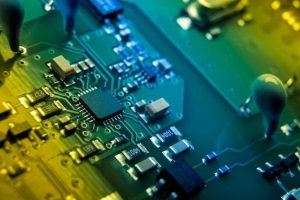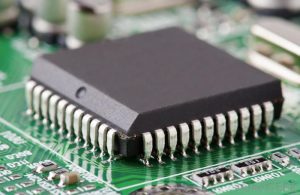Last Updated on October 13, 2022 by Kevin Chen
Image Source: FreeImages
In today’s world, integrated circuits are everywhere. They are used in almost all devices to process information, store data, and communicate electronically. Integrated circuits go by many different names: chips, microchips, ICs, or simply integrated circuits or ICs.
They all refer to the same thing. An IC is a semiconductor device with multiple electronic components that has been fabricated on a single piece of silicon and can perform one or more logical functions.
Integrated circuits contain many transistors that have been packaged together as a single chip. In this article, we’ll explore the difference between integrated circuits and transistors and when each one should be used in your designs.
Basics of a transistor?
A transistor is a semiconductor device that can be used as a switch or an amplifier. A transistor is composed of a “base” (a middle section), “collector” (end section), and “emitter” (end section). There are also “source” and “drain” terminals in the middle of the device, as well as a “gate,” which is the control terminal.
A transistor conducts electricity when a voltage is applied to the base and the base is allowed to “source” current by way of the collector. The emitter is the source of the current, and the collector is the drain where the current terminates.
Basics of integrated circuits ?
An IC is a semiconductor device that has been fabricated on a single piece of silicon and performs one or more logical functions. A typical integrated circuit comprises of numerous electronic components, including resistors, capacitors, and transistors.
Each of these components is fabricated on the silicon by way of diffusion or ion implantation. The individual components are then interconnected by way of wiring that is deposited on top of the silicon.
What are the functions of transistors?
While there are different types of transistors, all of them tend to serve the same purpose. They are used as switches for electronic signals. This means that the transistor acts as a switch that is either open or closed.
Transistors are also used to amplify electronic signals. In this case, the transistor amplifies the current entering through the collector and emitter.
What are the functions of integrated circuits?
Since ICs are large and complex, they are designed to perform many different functions, but the most basic functions include amplifying or switching current and storing data.
Some of the more advanced functions include sequencing, counting, and displaying data. ICs are used in almost all devices to process information, store data, and communicate electronically.
Some of the more common ICs include microprocessors, microcontrollers, logic gates, and shift registers. There are thousands of different ICs available for purchase, so you can use the ones that best fit your design.
How many transistors are in an IC?
There are no set rules regarding the number of transistors in an IC, and it really depends on the type of IC and the function it performs.
But in general, the number of transistors in an IC is in the thousands.
Pointers for choosing IC and transistors: What you should look at?
Image source Autodesk
Whether you want to buy an integrated circuit or a transistor, there are a number of things that you should keep in mind. These technical details and features may include but are not limited to the following:
The current capacity of the IC and transistor – You want to make sure the IC can handle the current capacity of the circuit it is connected to.
The power supply voltage – Make sure the voltage can handle the load you’re planning to use it for.
-The package type of the component – It is important to consider the package type when you are choosing your integrated circuit or even transistor because the package type determines where you will be mounting the IC.
-The pinout of the IC – The pinout of the IC shows you which connection points are sourced to ground and which ones are sources of current. For the transistor, you will have to be careful with the connection that it creates.
-Compatibility with the device: Ensure that the IC or transistor that you are about to buy is fully compatible with the device that you want to use it for.
-Design, structure and construction: You need to be very careful with the design, structure, and construction of the integrated circuit or transistor because you want it to be durable and long-lasting.
-Cost: The price of the integrated circuit or transistor is one of the things that you should factor in when you are planning to buy one. You will want to get a cheap IC or transistor that can work well for you.
-Availability: You should also make sure that the IC or transistor is available in your location before you head out to shop for one.
Choosing reliable ICs and transistors distributors in China
When it comes to buying integrated circuits and transistors, the source will always matter. Always strive to buy from a reliable electronic component supplier or manufacturer.
One of the most important things you should look for when choosing an IC and transistor distributor is the supplier’s ability to meet your production schedule.
Another important thing to look for when choosing an IC distributor is their ability to source the ICs you want. You want to make sure the distributor has access to all the different types of ICs and transistors you need, including any special types you want to use.
Consider reading the reviews of the distributors so that you can find out what other people think of them. Plenty of negative reviews will definitely be a red flag that you should not ignore.
Conclusion
Integrated circuits and transistors are very important components because they help simplify a number of electronic designs by reducing the number of electrical components needed, thus lowering cost and increasing functionality. They are very useful for designing all kinds of electronic devices such as radios, television sets, cameras, computer systems, etc.
From this guide, it is crystal clear that integrated circuits are completely different electronic components from transistors. In fact, transistors are components of ICs and not the other way around.
If you want to find more Electronic Components Distributors, please check out the following articles:
Electronic Components Distributors In the USA
Electronic Components Distributors In UK
Electronic Components Distributors In China
Electronic Components Distributors In India
Electronic Components Distributors In Singapore
Electronic Components Distributors In Malaysia
Electronic Components Distributors In Vietnam
Electronic Components Distributors In South Korea
- Where to buy IC chips? The Best Guide? - March 26, 2024
- Breaking Down Barriers: Overcoming Obstacles in Cross-Border Electronic Component Trade - March 4, 2024
- Everything You Need to Know About Amplifier IC Chips - March 4, 2024






